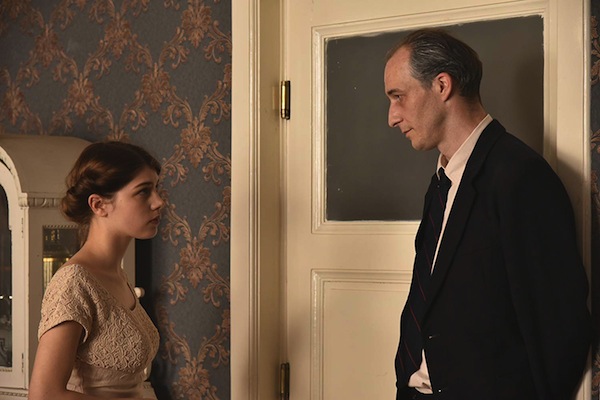Dr. Peter Suedfeld speaks at the International Holocaust Remembrance Day commemoration at the Bayit. (photo by Pat Johnson)
As a child in Budapest, Dr. Peter Suedfeld’s family spoke Hungarian in the home and considered themselves Hungarians first and Jews second.
“If you asked us, ‘What are you? Who are you?’ The answer would be Hungarians,” he said. “Interestingly, we thought that that’s what the people around us thought also, that that’s what we were – Hungarians. It turned out a little later that we were mistaken.”
Suedfeld shared his family’s Holocaust story and his survival Jan. 26 at the International Holocaust Remembrance Day commemoration (IHRD) at the Bayit synagogue in Richmond.
Miklós Horthy, the regent of Hungary during most of the war, did not share Hitler’s determination to destroy the Jewish people, Suedfeld said. As a result, the status of Jews in the country was not markedly worse than that of other Hungarians during the early war years.
“By 1944, things were very different,” Suedfeld said. “It was increasingly likely that Germany, contrary to all expectations, was not going to win the war.”
The Soviets had pushed back the German advance on the Eastern Front and the Western Allies were close enough to bomb Budapest routinely. Food was scarce, as resources were being pilfered and transported to Germany.
Realizing that the Hungarians had chosen the wrong side in this war, as they had at other times in history, Horthy went on the radio and announced that his country was surrendering, Suedfeld explained, whereupon Hitler directly occupied Hungary for the first time. Horthy’s government was replaced with an overtly fascist regime, the Arrow Cross.
“They took it upon themselves to carry out the full Nuremberg Laws and all the persecution that had happened in Germany and Poland,” said Suedfeld. “It came later to us than it had many other countries in Europe but, when it came, they were determined to catch up.”
Adolf Eichmann himself, mastermind of the “Final Solution,” was sent to oversee operations in Hungary. Jews were forced to wear the yellow star for the first time and executions of Jews began in earnest.
Jews were taken to the banks of the Danube, where they were lined up in groups of three, tied together, their shoes removed, and then the middle person in the trio was shot. When the middle person fell into the river, the other two were dragged down and drowned, accomplishing the objective with one bullet rather than three. Suedfeld said 30,000 are estimated to have been murdered in this fashion.
Suedfeld’s paternal grandfather, a hero from the First World War, had died a few years earlier. He had assumed that his military accomplishments would shield his family from whatever antisemitic legislation was passed.
“He died before he found out that he was wrong,” said Suedfeld, whose paternal grandmother astonishingly survived the Holocaust. His mother’s parents entered the ghetto, where they soon died from the privations there.
Young Peter’s own story of survival was improbable. His mother was taken from their home while 8-year-old Peter watched, not knowing it would be the final time he saw her. She was taken to a holding camp in Hungary and from there to Auschwitz.
His father was drafted into forced labour and later experienced a death march and incarceration at Mauthausen, “one of the worst of those cruel, vicious camps.”
“But he survived,” Suedfeld recounted. “After the war, he was given a job, because he spoke English, interrogating suspected war criminals and SS officers captured in the vicinity. He enjoyed it.”
Young Peter survived after his mother was arrested because his aunt discovered him alone at home. She took him and decided, with his grandparents, that he should be hidden.
“They somehow found out that the International Red Cross had some orphanages started around the city. They were for war orphans but they smuggled a few Jews in when they thought they could get away with it,” he said. “I was a good candidate for hiding because I was blond and had blue eyes so I could get away with pretending I wasn’t Jewish.”
Like many survivors, Suedfeld’s existence is a result of an incalculable number of close calls and lucky chances. In just one instance, near the end of the war, the group of orphans he was with were being transported from one location to another. They were lining up to cross over a little fence when some soldiers saw them and may have assumed they were enemy forces. Machine gun fire burst forth.
“Shots were fired and the kid on my left was hit,” said Suedfeld. “And the kid on my right was hit. But when it was pointing at me was the time that the next cartridge was being fed into the gun and so there was no shot. Pure dumb luck.”
Peter and his father fled Hungary when the communists took power. Suedfeld made his way to the United States in 1948, served in the US Army, eventually received a doctorate from Princeton University in 1963 and taught at American universities before moving to Vancouver. He was appointed professor of psychology at the University of British Columbia in 1972. His work and research are concerned with how human beings adapt and cope with challenge, stress and resilience.
At the commemoration, the Bayit’s Rabbi Levi Varnai reflected on the word zachor, remember.
“We are obligated to remember, today, tomorrow and really every single day,” he said. “Zachor is always important but it feels like today it’s even more important than ever before.”
He acknowledged the nine Holocaust survivors in attendance and expressed regret that, after their childhoods were stolen, their golden years are now tarnished by witnessing a new surge of antisemitism.
“As much as we want to focus on the future and as much as we want to continue to build and not always think about our dark past, the only way to ensure a proper future is by remembering the atrocities, the hardships of the past,” the rabbi said. “We are lucky that we still live in an age that we can come into a room to witness survivors and share their testimonies. It is our obligation to take these stories and make sure that they will never ever be forgotten.”
Ezra Shanken, chief executive officer of the Jewish Federation of Greater Vancouver, noted the significance of the presence of elected representatives at the event.
“If only our ancestors had public officials showing up like this and talking about how we have to create a safer space,” said Shanken, who said that people have asked him how bad antisemitism needs to get in Canada before Jews consider leaving the country.
“When do we get out of here?” he asked. “We get out of here when the government starts making laws against us.” Governments in Canada of all parties, he said, “have been steadfast in trying to voice the need for safety and security for the Jewish people and for all people across our country, our province, our cities. I want to thank them for spending time with us tonight.”
Michael Sachs, director for Western Canada of the Friends of Simon Wiesenthal Centre and a past president of the Bayit, who initiated the annual Holocaust remembrance event six years ago, noted that the commemoration was taking place “amidst the worst, most sustained amount of antisemitism that Canadian Jews have ever experienced.”
“Survivors are a constant source of inspiration and wisdom for us,” he said. “No one can speak with a greater authority on what can happen when hate is left unchallenged than these survivors. For them, having witnessed firsthand and paid a dear price for society not standing up to the worst impulses of humanity, this is not academic.”
He asked everyone in attendance to redouble their efforts toward education about the Holocaust and about modern-day manifestations of antisemitism.
“Jews cannot fight antisemitism alone, nor should we – not if we want a better society for all,” said Sachs. “The light of education shall lead our way.”
Steveston-Richmond East Member of Parliament Parm Bains represented the federal government and read greetings from Prime Minister Justin Trudeau. Kelly Greene, MLA for Richmond Steveston and minister of emergency management and climate readiness, brought greetings from Premier David Eby. All three of Richmond’s other MLAs – Teresa Wat (Richmond-Bridgeport), Steve Kooner (Richmond-Queensborough) and Hon Chan (Richmond Centre) – were present. Richmond Mayor Malcolm Brody read a city proclamation and was joined by councilors Bill McNulty, Andy Hobbs and Alexa Loo. Richmond RCMP chief superintendent Dave Chouhan was also in attendance. Bayit president Keith Liedtke emceed.
Nine Holocaust survivors lit candles. Cantor Yaacov Orzech chanted El Moleh Rachamim. Dr. Abby Wener Herlin, associate director of programs and community relations at the Vancouver Holocaust Education Centre, introduced Suedfeld.
The event was co-sponsored by the Bayit, Vancouver Holocaust Education Centre, Friends of Simon Wiesenthal Centre, Jewish Federation of Greater Vancouver, Centre for Israel and Jewish Affairs and Kehila Society of Richmond.




